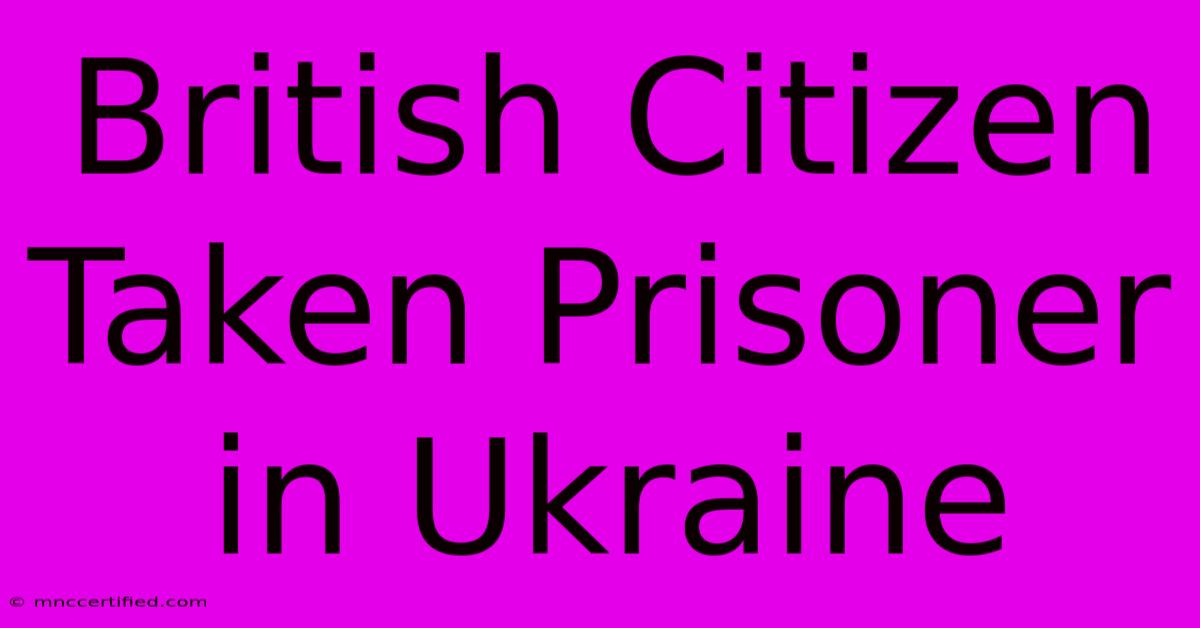British Citizen Taken Prisoner In Ukraine

Table of Contents
British Citizen Taken Prisoner in Ukraine: A Complex and Evolving Situation
The capture of British citizens in Ukraine has become a tragically recurring event in the ongoing conflict. This situation presents a complex interplay of geopolitical tensions, humanitarian concerns, and legal ambiguities. Understanding the nuances of these cases is crucial for both informed public discussion and effective advocacy for those detained.
The Challenges of Determining the Facts
Verifying information surrounding the capture of British citizens in Ukraine can be incredibly difficult. The fog of war, coupled with conflicting narratives from various sources – including the Ukrainian government, Russian-backed separatists, and the individuals themselves – often makes it challenging to establish a clear and accurate picture of the circumstances surrounding their detention. Propaganda and disinformation further complicate efforts to determine the truth.
Key Challenges in Information Gathering:
- Access Restrictions: Limited access to conflict zones restricts independent verification of events.
- Conflicting Accounts: Differing narratives from involved parties hinder the establishment of objective facts.
- Information Control: Both sides in the conflict may control information dissemination to serve their political agendas.
- Security Concerns: Publicly releasing too much detail might jeopardize the safety of the detained individuals and ongoing negotiations.
The Legal and Diplomatic Ramifications
The legal status of British citizens captured in Ukraine is often complex and contested. Whether they are considered prisoners of war (POWs), combatants, or civilians held under criminal charges depends heavily on the specific circumstances of their capture and their actions prior to detention. This ambiguity creates significant hurdles for diplomatic efforts to secure their release.
Key Legal and Diplomatic Issues:
- Geneva Conventions: The applicability of the Geneva Conventions, which outline the treatment of POWs, is often debated. This depends on whether the individuals are considered combatants or civilians.
- Jurisdiction: Determining which legal system has jurisdiction over the case can be complicated, depending on the location of capture and the accusations against the detained individual.
- Diplomatic Negotiations: Securing the release of British citizens usually requires intricate diplomatic negotiations with various parties, often involving sensitive back-channel communications.
- Potential Charges: Accusations against captured citizens can range from mercenary activities to espionage, significantly impacting the legal process and potential for release.
The Humanitarian Aspect: Concerns for the Welfare of Detainees
Beyond the legal and diplomatic complexities, the primary concern is always the well-being of the captured British citizens. Their safety, health, and access to appropriate legal representation are paramount. Organizations like the Red Cross play a vital role in monitoring the treatment of detainees and facilitating communication between families and authorities.
Key Humanitarian Concerns:
- Conditions of Detention: Ensuring humane treatment and access to basic necessities like food, water, and medical care.
- Access to Legal Counsel: Providing detained individuals with adequate legal representation to protect their rights.
- Family Support: Maintaining contact between detainees and their families to mitigate emotional distress.
- Transparency: Demanding transparency and accountability from all parties involved in the detention and treatment of British citizens.
Staying Informed and Taking Action
Reliable information about British citizens taken prisoner in Ukraine is crucial. Rely on reputable news sources and official statements from the UK government. Advocacy groups focused on prisoners of war and human rights can provide further insight and avenues for support. Staying informed allows you to make informed decisions and, if you wish, participate in respectful discussions and advocacy efforts.
Remember: Spreading misinformation or speculation can be detrimental to ongoing efforts to secure the release and well-being of those detained.
This article provides an overview of a complex and rapidly evolving situation. Specific details regarding individual cases may vary considerably. Always consult reliable and up-to-date sources for the most accurate information. This article is for informational purposes only and does not provide legal or diplomatic advice.

Thank you for visiting our website wich cover about British Citizen Taken Prisoner In Ukraine. We hope the information provided has been useful to you. Feel free to contact us if you have any questions or need further assistance. See you next time and dont miss to bookmark.
Featured Posts
-
Life Insurance Cold Call Script
Nov 26, 2024
-
Swftcoin Price Prediction 2030
Nov 26, 2024
-
November 24th Airline Hijacking Case
Nov 26, 2024
-
Marvel Trading Cards Value 1991
Nov 26, 2024
-
Cheap Boat Insurance California
Nov 26, 2024